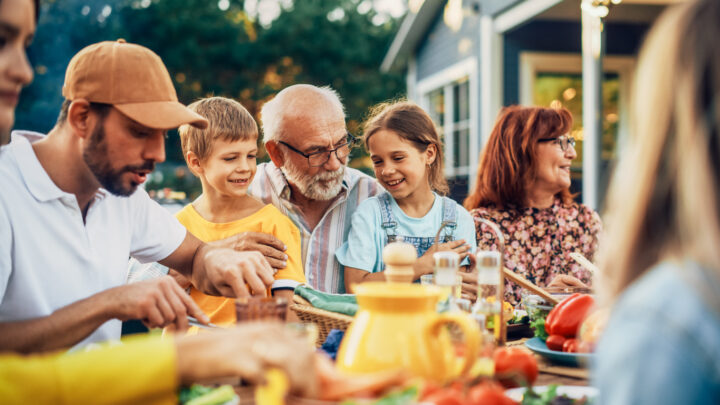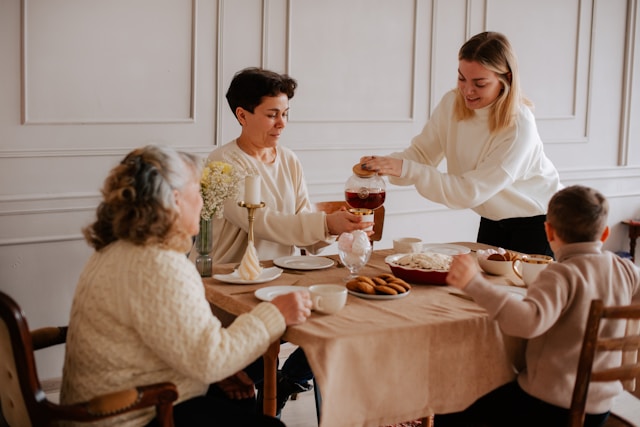Life moves fast, and between school runs, work stress, and constant distractions, it’s easy for families to slip into a routine that feels more like coexisting than truly connecting.

That’s where family rituals come in—not grand events or over-planned moments, but small, repeated actions that give everyone a sense of belonging, stability, and closeness. These rituals don’t need to be perfect or even traditional. What matters is the intention behind them.
Whether it’s a 10-minute chat before bed or a monthly outing, the consistency and shared experience help build deeper bonds. Here are some things you can do as a unit that can bring your family closer, one meaningful moment at a time.
1. A meal together without distractions

Sitting down for a meal as a family—whether it’s breakfast, dinner, or even weekend brunch—can be surprisingly grounding. It’s less about the food and more about the chance to check in with each other without phones buzzing or TVs blaring. Even if it’s just a few times a week, this shared pause in the day can help create space for genuine conversation and connection. As time goes on, it becomes a reliable anchor in the chaos of daily life.
2. Weekly family check-ins

Setting aside a bit of time each week to talk about how everyone’s doing emotionally, socially, or even just mentally can open the door for honesty and support. These chats don’t need to be formal, just intentional. Kids especially benefit from having regular space to be heard, and it shows them that their thoughts and feelings matter. Plus, it helps you catch things early, before they grow into bigger issues.
3. Friday night fun tradition

Whether it’s a pizza night, movie marathon, or playing a board game, having a consistent Friday night ritual can be something everyone looks forward to after a busy week. It sets the tone that family time is a priority. It doesn’t have to be fancy or expensive. The key is the consistency—it becomes a comforting rhythm that signals togetherness and celebration, even if you’re just in your pyjamas at home.
4. One-on-one time with each family member
 Source: Unsplash
Source: Unsplash While group time is important, carving out moments for individual connection makes each person feel uniquely valued. Whether it’s a solo walk, a coffee run, or a shared hobby, that personalised attention builds trust and closeness. Even 10 minutes of focused time can mean a lot, especially for kids who might be competing for attention. It reminds them they’re seen not just as part of the family, but as their own person too.
5. Celebrating small achievements together

From finishing a tough project to overcoming a bad day, acknowledging and celebrating small wins creates a culture of encouragement and pride within the family. It teaches everyone to cheer each other on, even when the milestones aren’t huge. This could be a special dinner, a note on the fridge, or simply a shared high-five. These little celebrations help create a positive emotional environment that brings people closer, one win at a time.
6. Seasonal or holiday traditions

Whether it’s carving pumpkins, baking biscuits at Christmas, or planting flowers in spring, marking the seasons with shared rituals builds lasting memories. These moments give everyone something to look forward to, year after year. Even the quirkiest traditions can become sacred over time. It’s less about the activity itself and more about the feeling of belonging it creates when you know, “This is something we do—together.”
7. Creating a shared playlist or family soundtrack

Music has a way of connecting people emotionally, and curating a playlist together can be a fun and bonding experience. Each person contributes their favourites, creating a mix that reflects everyone’s taste and memories. Whether it’s for car rides, cooking, or background music on a Sunday morning, this shared soundtrack becomes part of your family’s story. Plus, it sparks conversations about nostalgia and discovery along the way.
8. A bedtime wind-down routine

For families with children, having a simple bedtime routine that includes connection—like a story, a chat, or a moment of gratitude—can be a beautiful way to end the day. It provides emotional safety and consistency, especially during stressful times. Even with older kids or teenagers, a brief check-in before bed shows them they’re not going to sleep alone with their thoughts. It’s a gentle way to stay emotionally tethered in the quiet moments of the day.
9. Sunday reset or tidy-up together

Spending a bit of time on a Sunday afternoon cleaning, organising, or preparing for the week can become surprisingly bonding, especially if you play music, laugh, and turn it into something you do as a team. It’s less about the task and more about the collective effort. Everyone contributes, everyone benefits, and it becomes a quiet way of saying: we’re in this together, and we take care of our space, and each other.
10. Storytelling from family history
 Source: Unsplash
Source: Unsplash Sharing stories from your own childhood, your parents’ lives, or funny family tales can help strengthen your family’s sense of identity. It helps children feel like they’re part of something bigger and gives everyone a deeper sense of connection to where they come from. These moments often spark laughs, curiosity, and emotional warmth. It’s a way to honour the past while creating new memories, and it opens the door to deeper conversations that might not otherwise happen.
11. Cooking or baking something together

Preparing food as a group might sound chaotic, but it’s one of the simplest ways to bond. Whether it’s trying a new recipe or sticking to a weekly favourite, the shared act of chopping, stirring, and tasting brings everyone into the moment. Cooking together also teaches teamwork and patience. And when the meal’s finally ready, everyone feels invested in it, which makes it taste even better. It’s nourishment in every sense of the word.
12. A gratitude ritual at the end of each week

Ending the week with a moment to reflect on what you’re all thankful for, big or small, can help reframe the stress of the past few days. It’s a chance to slow down and share appreciation, even if things weren’t perfect. This could be done at the dinner table, during a walk, or even in a shared family journal. Gratitude creates emotional connection, perspective, and a sense of shared resilience. And when done regularly, it becomes a quiet but powerful ritual that holds a family together.




